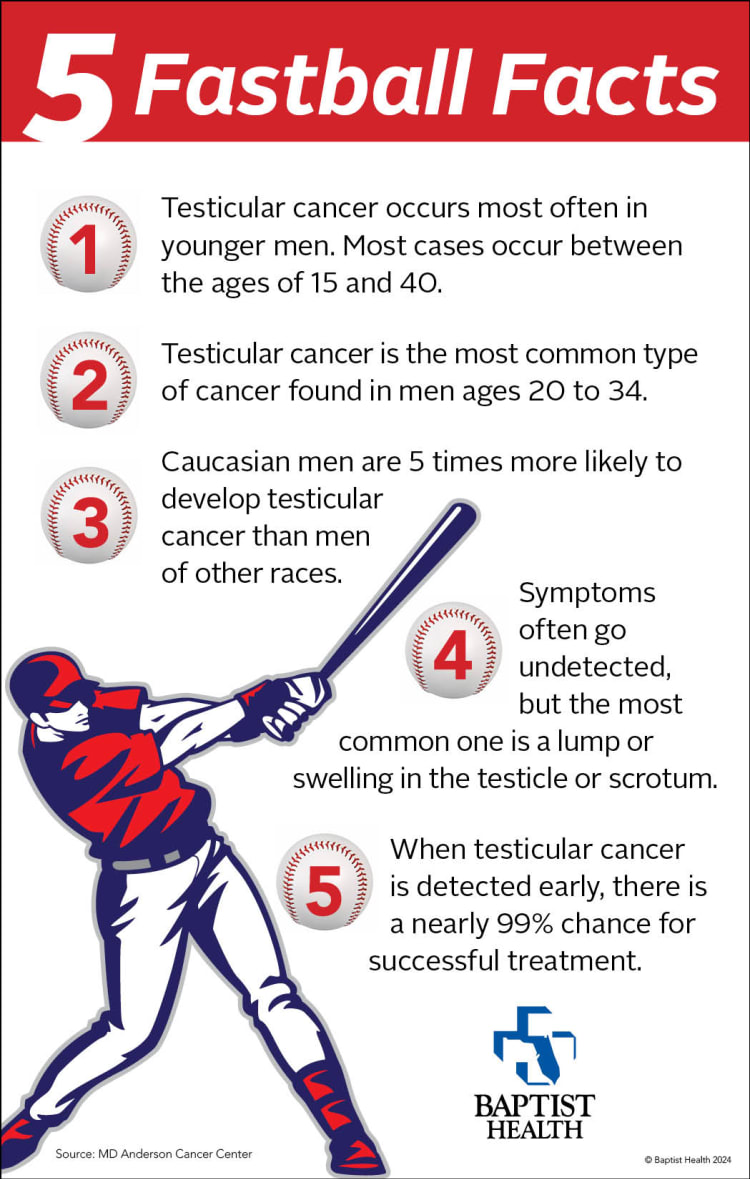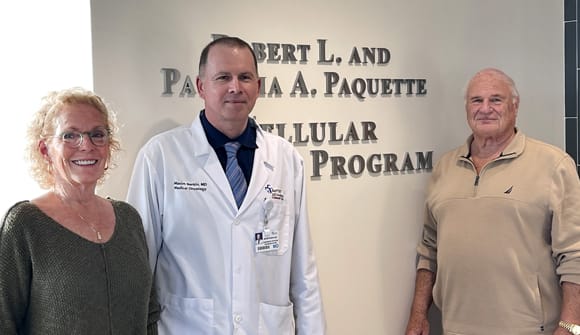Prakash Chandran: You may have seen more men sporting mustaches lately. And there's a good reason for this. In November, many men grow out their facial hair to raise awareness for men's health issues that are leading to higher death rates among younger males. This movement is known as Movember, and it's also a charitable organization that aims to reduce the number of men dying prematurely by 25% in the next decade.
Our guest today is Dr. Lael Stieglitz, a general urologist for Baptist MD Anderson Cancer Center. Dr. Stieglitz oversees the men's sexual health program at Baptist MD Anderson and helps both cancer and non-cancer patients with questions and concerns regarding their sexual care and sexual health.
Welcome to Baptist Health Radio. As the most preferred healthcare provider in Northeast Florida, we're here to help you stay informed with the latest news, views and resources for your health and wellbeing. My name is Prakash Chandran. So Dr. Stieglitz, thank you so much for joining us today. Really appreciate your time.
You know better than most people that men don't always open up about their health problems, especially when it comes to sexual health challenges. That's why movements like Movember, which focus on mental health, prostate cancer and testicular cancer are so important. Isn't that something you'd agree with?
Lael Stieglitz, MD: Yes, I agree with that wholeheartedly. I love this month. If I could grow mustache, I would and support.
Prakash Chandran: So, before we kind of get into that more broadly, can you tell us what are some of the most common sexual health problems that you see?
Lael Stieglitz, MD: Sure. I mean the most common sexual complaint that I have in my clinic would be erectile dysfunction. And whether this is a cancer patient part of MD Anderson or someone who doesn't have cancer at all and comes in from the surrounding areas, that would be the the number one sexual health complaint.
Prakash Chandran: And just so men out there know, how common is erectile dysfunction? Is it something that is very prevalent? Is it something that's uncommon? Maybe you can speak to that.
Lael Stieglitz, MD: Sure. No, I think that men don't know how common it is and they don't want to talk about it. But when you look at all men over the age of 20, one in five have some degree of erectile dysfunction. And then when you look at men over the age of 40, it's 50%. The total number of men in America right now with some degree of erectile dysfunction is 39 million men.
Prakash Chandran: Yeah, that is amazing. I had no idea that that number was so high. And, you know, a lot of issues like erectile dysfunction might be embarrassing for men. So one of the things that I wanted to ask is how do you encourage your patients to feel comfortable enough to talk to you about the issues that they might be having.
Lael Stieglitz, MD: Sure. Well, I think first of all, you have to make sure you have the right relationship with the right doctor, right? So, you know, I might not bond with every single patient and they'll go see someone else and that's fine. But, you know, when you come into my clinic, you're going to be relaxed. You're going to laugh before you leave. I'm going to tell some sort of joke, you know. You get to the point. And you tell them, you know, "This is probably weird for you, but it's not weird for me because I do this all day every day." and I ask them directed questions and anything they say, they know it's a safe place. And I haven't had a single male patient leave for a second opinion yet. So I think that setting up a relaxed environment and just being direct in asking them is a really good way to make you feel comfortable.
Prakash Chandran: Yeah, that makes a lot of sense. And one thing that I want to point out is the decision to pick up the phone and to call into the doctor's office to address, for example, something like erectile dysfunction. It's a big decision for men and even talking with the receptionist because they obviously collect the information about why you're calling, that environment has got to be welcoming and right for the man to feel comfortable to pick up that phone, wouldn't you say?
Lael Stieglitz, MD: Yes, exactly. And that's why at Baptist MD Anderson, we named it a men's health clinic. So the men don't have to call in and say, "I have erectile dysfunction." They call in and say, "I'd like to be seen in the men's health clinic," because I see a lot of other conditions. I see low testosterone. I see, you know, a lot of other men's specific complaints all under that umbrella. So it helps like keep it a little anonymous for them until they get in the room with me.
Prakash Chandran: Yeah, I think that's wonderful. So one of the other questions I wanted to ask is what role do you encourage the man's partner to take in all of this?
Lael Stieglitz, MD: I usually love for the partner to be present. And if the partner is not present, I'm going to ask because not all patients have a partner, you know, everyone's story's a little bit different. But if they have a partner and if we're going to move forward with treatment, I really like the partner to be involved.
And the other aspect of this too is, you know, you can can fix the man's erections, you can do something like, you know, the most durable would be doing a penile implant, but if his partner doesn't want to have intercourse, the patient's not going to be happy. So, you know, I tell patients, I joke, "I'm like half a urologist, half a therapist," because I do a lot of like couples, you know, not necessarily counseling, I'm not a therpist, you know, per se, but you know, I look at the dynamic and if the woman needs help or the other male partner, whatever the situation is, but like especially if it's a woman, maybe she's had gone through menopause and sex is painful for her. Well, I have resources for that and there's other people in the building who have resources for that also. So think it's very important to get the partners involved and I encourage it from day one if they have one.
Prakash Chandran: Yeah, it's so good that you're bringing that to the surface. One thing that resonates with me is, you know, me and my partner just had our second child and being intimate is the absolute last thing on our minds, even though it's something that we consider important. And we actually sat down for the first time and discussed that. It kind of is unnatural, I think, for men and what we're taught in society, that you can't bring this out into the open. So I think it's important to not only talk to your partner about it, but have them be a part of getting help and a part of the discussion when it comes to men's sexual health, wouldn't you say?
Lael Stieglitz, MD: Exactly.
Prakash Chandran: So, you know, you talked about being part therapist. And one of the things that I've noticed is that mental health is included in the Movember movement. What part does mental health play when it comes to one's sexual health?
Lael Stieglitz, MD: Well**,** it's the first step, right? brain is the first step in the process for intimacy. Your brain has to want it. And so if you are depressed, if you're anxious, if you're not sleeping well, then you're going to have less of a sex drive. Or if you have the libido, maybe less physical capability, because, you know, I go through all of the steps of obtaining an erection, you know, in detail in my clinic, it's too much for this podcast right now, but it definitely starts in the brain. And so I always talk to my patients about their mental health when they're sitting in my office.
Prakash Chandran: Now, you have probably seen lots of men, lots of couples come into the office in all of your experience. If there's one thing that you know to be true, something that you wanted to share with our audience that's listening, what might that be?
Lael Stieglitz, MD: I want people listening to know that if you want help with intimacy with your partner, there is help. You don't have to say, you know, "I'm 65. It just doesn't work anymore," because that's not the answer. And if it's not acceptable to you and your partner, then it's not acceptable to me. And, you know, you might laugh at me or with me along the way, but if that's a goal for your relationship or your life, we're going to get you there. And I fully support my patients in doing that because I think it's a very important part of life and companionship.
Prakash Chandran: I'd like to ask a more broad question. You know, we're talking about men's sexual health, but what does it exactly mean to be sexually healthy?
Lael Stieglitz, MD: Well, I mean, that's kind of a tough question. I define it not just as, you know, having an erection, but being able to be intimate with your partner. And so I see that in all sorts of different ways. There are men for whatever reason can't have an erection and, you know, they're not necessarily candidates to restore it, but they find intimacy in other ways. So that's part of my role as sort of as counselor, educate men about, you know, like after you've had a prostatectomy, you're going to have an orgasm, but it's going to be very different and it's going to feel different. And some of this is just me educating my patients. So I try from the beginning to find out what their goals are and then I try to meet them there because no patient has been the same. And that's one of the best parts about this job is that everybody's different.
Prakash Chandran: Okay. Wonderful. So just before we close here, is there anything else that you would like to add today just regarding men's sexual health?
Lael Stieglitz, MD: Yeah, I also just want, you know, any of the men listening, men's sexual health is important. It's also potentially a market where you might get false information. You're listening to the radio. You're watching commercials. There's a lot of clinics around town not run by urologists who will take your money for different procedures that aren't endorsed by the American Urological Association or the Sexual Medicine Society of North America.
So men, this is a very important part of your body. You know, my catchphrase is "You can't say happiness without saying penis." So don't spend cash and go to these little pop-up clinics. Go see a urologist. See me, see someone else. There's other wonderful urologists in town, but, you know, your health insurance should pay for your medical care and that includes your sexual health. Don't spend cash on these clinics that are doing things that are categorized as experimental by the Urology Association.
Prakash Chandran: Well, I think that's great advice. Thank you so much for your time today, Dr. Stieglitz.
Lael Stieglitz, MD: Thank you for having me.
Prakash Chandran: That's Dr. Lael Stieglitz, a general urologist for Baptist MD Anderson Cancer Center. To find out more about the men's sexual health program at Baptist MD Anderson or to book an appointment with Dr. Stieglitz, you can call (904) 202-7300 or visit baptistmdanderson.com.
Thank you for listening to Baptist Health Radio. Please be sure to check out the entire podcast library for topics of interest to you. My name is Prakash Chandran. Thank you so much again for listening,





